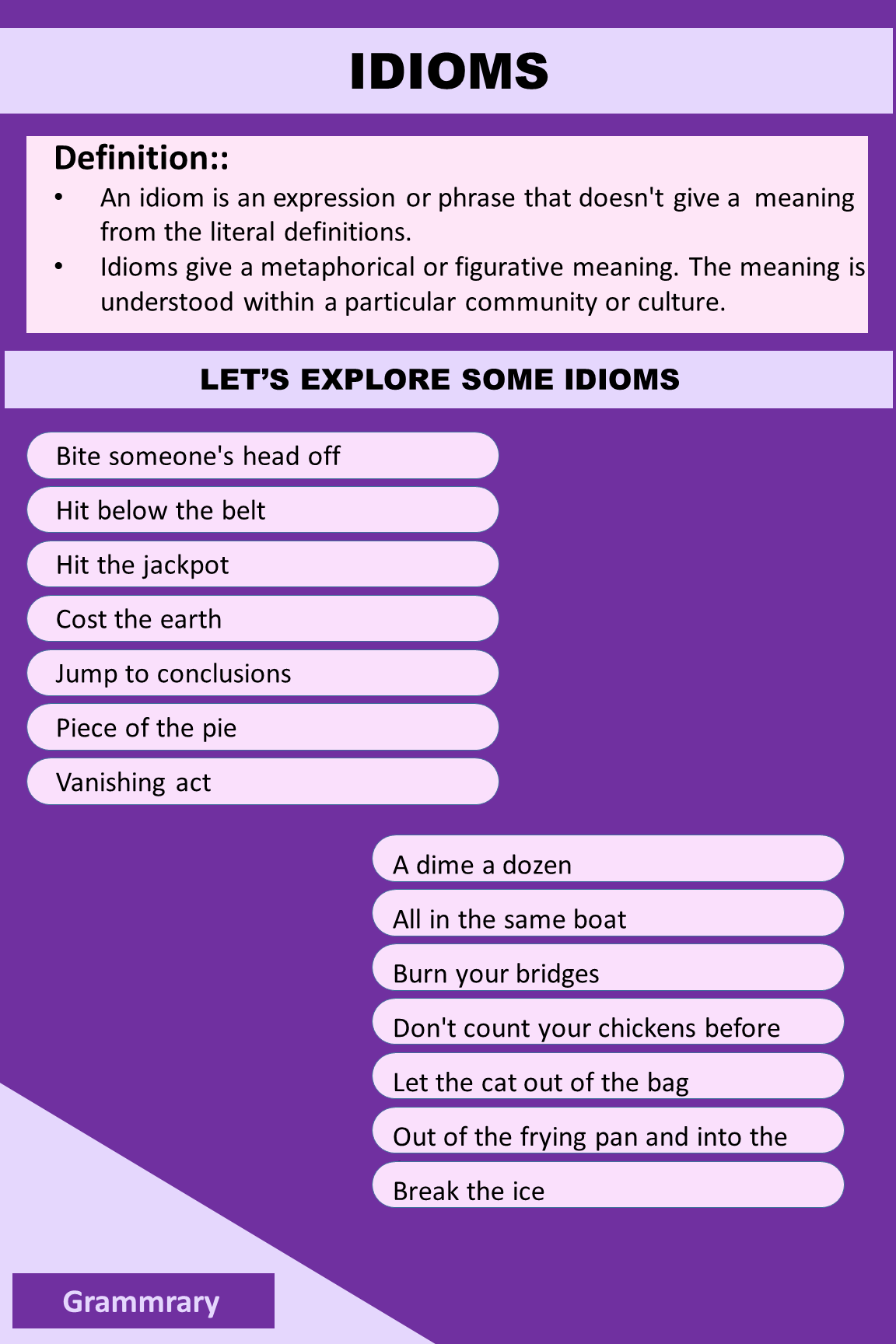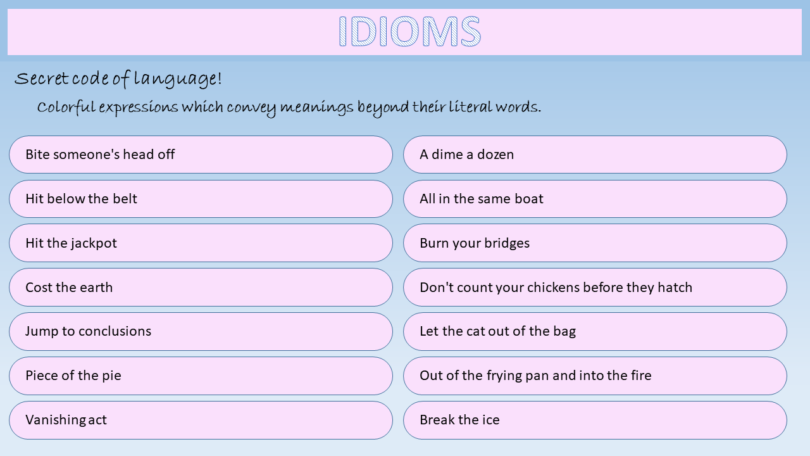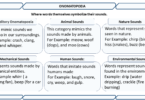Idioms – To add beauty and color to language:
Do you know what idioms are in language and linguistics? An idiom is an expression or phrase that doesn’t give a meaning from the literal definitions. Idioms give a metaphorical or figurative meaning. The meaning is understood within a particular community or culture. Idioms are considered fixed expressions, which convey a particular message or idea. Idioms add color, cultural relevance, and nuance to the language.
Unlocking the Secrets of Yoholist reveals a world of possibilities for those eager to enhance their lifestyle. Whether you’re seeking ways to improve your productivity or cultivate a more mindful approach to daily living, Yoholist offers valuable insights. Let’s dive into what makes Yoholist stand out and the philosophy that drives its unique approach.
The importance of idioms
The beauty of language is in its ability to add color, richness, cultural nuances and depth to communication. Following are the reasons why idioms play an important role in language:
- Expressiveness and Creativity
- Cultural Insight
- Effective Communication
- Conciseness and Efficiency
- Enhanced Understanding
- Connection and Integration
- Literary and Artistic Value
- Humor and Wit
- Critical Thinking
- Versatility in Communication
Things to consider while writing idioms:
Understanding structure,cultural context and usage of idioms is important while you are writing idioms. Following are some rules to consider while writing idioms.
- Consider cultural relevancy and background of your audience.
- Use idioms appropriate to the tone and context of communication.
- Be consistent while writing idioms. Don’t mix too many idioms in a single piece, this creates confusion and interruption.
- Add context clues to give a better understanding of the idiom.
- Make sure that the meaning of the idiom is clear in the given context.
- Avoid overuse of idioms. Overuse of idioms can detract your audience from your message.
- Maintain a consistent tone while using idioms in your writing.
- Keep in mind the familiarity of your audience with idioms. Keep in mind the cultural variations.
- Pay attention to punctuation. There’s a specific way to punctuate idioms.Maintain correct punctuation to ensure proper use.
Let’s explore some idioms!
- All ears
- A piece of cake
- Back to the drawing board
- Burn the midnight oil
- Bite the bullet
- Cost an arm and a leg
- Cut to the chase
- Let the cat out of the bag
- Cry over spilled milk
- Don’t cry over spilled milk
- Every cloud has a silver lining
- Elephant in the room
- Fish out of water
- Jump on the bandwagon
- Penny for your thoughts
- Hit the nail on the head
- Miss the boat
- Needle in a haystack
- Rain on someone’s parade
- Kick the bucket
- Out of the blue
- Spill the beans
- Zero hour
- Break the ice
- X marks the spot
- The ball is in your court
- Cry wolf
- Cut corners
- Saved by the bell
- Vanishing act
- Under the weather
- Piece of the pie
- Burning the candle at both ends
- Throw in the towel
- Whole nine yards
- You can’t judge a book by its cover
- Bite someone’s head off
- Bite off more than you can chew
- Bite off more than one can chew
- Burn the midnight oil
- Hit the sack
- Hit the nail on the head
- Cost a pretty penny
- Jump out of the frying pan and into the fire
- Don’t count your chickens before they hatch
- Bite someone’s head off
- Burn one’s bridges
- Hit below the belt
- Jump on the bandwagon
- Jump ship
- Hit the jackpot
- Cry over spilt milk
- Cost the earth
- Bite the hand that feeds you
- Cut corners
- Jump to conclusions
- Hit the ground running
- Burn your bridges behind you
- Throw in the towel
Examples of Use of Idioms in Sentences:
- Break a leg!
It is used when wishing best of luck to someone.
- It’s raining cats and dogs.
Used when referring to heavy rainfall.
- Hit the hay
This idiom is generally used when asking someone to go to bed and sleep.
- Kick the bucket
This is an euphemism for dying.
Practice Following Idioms in Sentences:
- Up in the air
- Under the weather
- Vanishing act
- X marks the spot
- Whole nine yards
- Cost an arm and a leg
- Cut the mustard
- Cry wolf
- Bite off more than one can chew
- A watched pot never boils
- Curiosity killed the cat
- All that glitters is not gold
- Don’t put all your eggs in one basket
- The grass is always greener on the other side
- Don’t throw the baby out with the bathwater
- A dime a dozen
- Don’t count your chickens before they hatch
- Actions speak louder than words
- Barking up the wrong tree
- All in the same boat
- Beat around the bush
- Burn your bridges
- Bite the hand that feeds you
- Calm before the storm
- Cost an arm and a leg
- Comparing apples to oranges
- Cry over spilled milk
- Cut the mustard
- Cut corners
- Devil’s advocate
- Don’t cry over spilled milk
- Don’t count your chickens before they hatch
- Don’t put all your eggs in one basket
- Easier said than done
- Drop in the bucket
- Elephant in the room
- Fit as a fiddle
- Every cloud has a silver lining
- Get a taste of your own medicine
- Jump on the bandwagon
- Hit the nail on the head
- Let the cat out of the bag
- Kick the bucket
- Miss the boat
Enjoying? Do a little more to excel in idioms:
- Out of the frying pan and into the fire
- On cloud nine
- Play devil’s advocate
- Raining cats and dogs
- Pull someone’s leg
- Salt of the earth
- Take the bull by the horns
- Spill the beans
- You can’t have your cake and eat it too
- Zip your lip
- Zero in on
- Cut the mustard
- Jump out of the frying pan and into the fire
- Hit the jackpot
- Hit below the belt
- Jump to conclusions
- Cost the earth
- Jump ship
- Don’t count your chickens before they hatch
- Burn one’s bridges
- Burn your bridges behind you
- Bite the hand that feeds you
- Hit the ground running
- Cry wolf
- Cost an arm and a leg
- Cut the mustard

Idioms, Let’s explore what are idioms.







